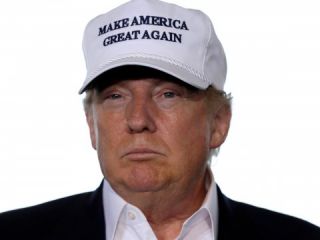The psychosocial dynamics of Trump's rise.
Gregg Henriques Ph.D.
 |
| Source: http://www.businessinsider.com/donald-trump-baseball-cap-on-sale-2015-7 |
Psychologists are, by and large, deeply aligned with a modern progressive left worldview, which explains their attitudes about Trump. But I was trying to instill in them the point that one of our roles as psychologists is (or should be) to read psychological dynamics in social movements. In the context of that point, I commented that Trump’s candidacy was a “wonderful thing to look at.” For a brief moment I received some quizzical looks, as my students thought I meant his rising status was a wonderful thing for the country. I quickly corrected them by clarifying that it was a wonderful thing to analyze from a psycho-sociological lens, because it was revealing of so many key dynamics regarding the current state of our country. I brought my concerns about his candidacy home by telling my students (with tongue firmly in cheek), that I advise all my patients that, when things are complicated and difficult and they are feeling vulnerable (as is the current state of our country and the world at large), my strong professional recommendation is to put all your trust in an egotistical blowhard who never apologizes or reflects and is certain that he is right about everything he says and does. After all, we know from our clinical work that submitting to such people almost always guarantees long-term positive outcomes!
With that point made, let’s shift to analyzing the dynamics here. What are the social and psychological forces that are driving Trump’s popularity? My basic analysis is that Trump embodies a narcissistic fantasy and defense against anxiety that is present in Traditional Christian White Males (TCWM), especially those who are disaffected (i.e., who have lower than average socio-economic status). Let me break this analysis apart, so we can clearly see the parts and how they are interacting to give rise to the Trump political phenomenon.
First, let’s start with understanding why there is a backdrop of anxiety associated with TCWM. A central root of this dynamic can be located in the loss of power and prestige associated with Traditional Christian White Maleness/Masculinity. Since the 1960s, the United States has experienced a sea change in power and dominance, especially at the socio-cultural normative level (i.e., what is socially justifiable). Throughout the history of our nation (and Western Europe more broadly), the power structures have been dominated by Traditional Heterosexual Christian White Males, and this dominance was legitimized with explicit justification. This fact is particularly salient for me because I've just finished listening to the excellent book Quartet: Orchestrating the Second American Revolution by Joseph Ellis. Consider the point he makes early in the book which is that, for the Founding Fathers, the idea of “equality” between the races or sexes was such an anathema as to not even be worthy of serious consideration.
But (thankfully) the (normative) hegemony of TCWMs has been chipped away, especially over the past 50 years, from the Civil Rights movements in the 60s to the Feminist movement in the 70s to the GLBT and secular/nonreligious movements of today. Although these forces have moved our society toward justice, it nevertheless is the case that they have come with a loss of relative power and prestige for TCWMs, which likely fosters anxiety and resentment especially in those who are disaffected.
Please continue this article here: https://www.psychologytoday.com/blog/theory-knowledge/201509/trump-psychosocial-analysis
No comments:
Post a Comment